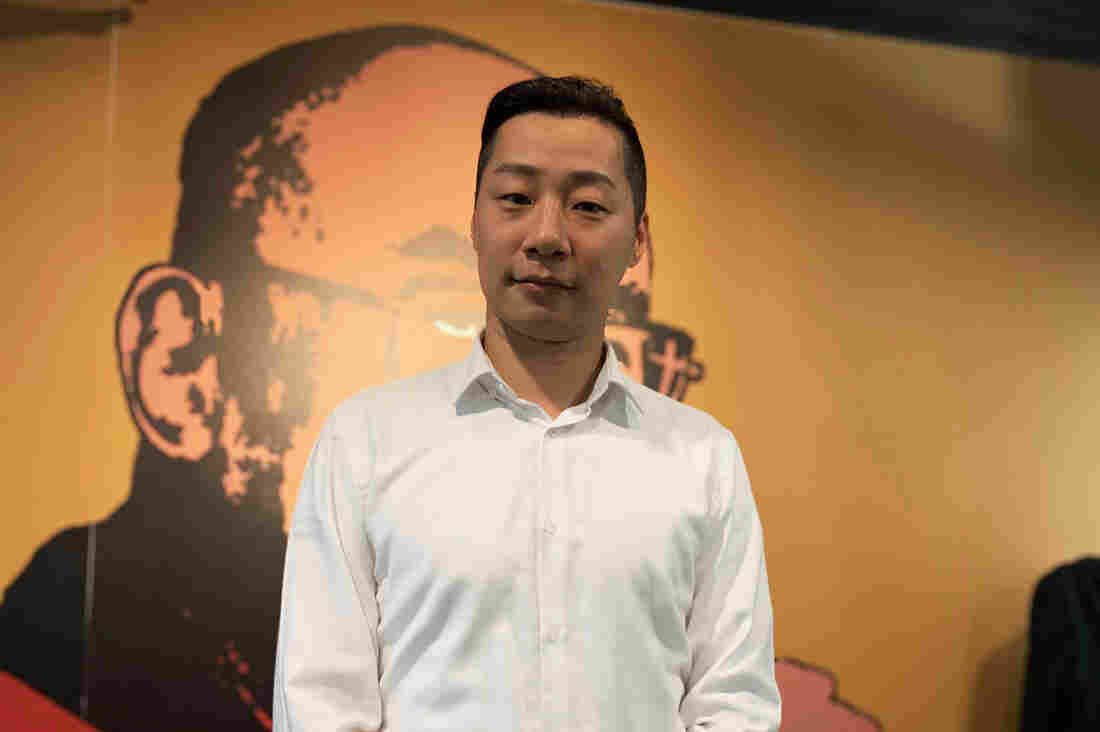
Members of a pro-Taiwan autocracy Taiwan Solidarity Union impetus in downtown Taipei in support of Hong Kong protesters perfectionist some-more leisure and autocracy from China.
Alberto Buzzola/LightRocket around Getty Images
hide caption
toggle caption
Alberto Buzzola/LightRocket around Getty Images
Members of a pro-Taiwan autocracy Taiwan Solidarity Union impetus in downtown Taipei in support of Hong Kong protesters perfectionist some-more leisure and autocracy from China.
Alberto Buzzola/LightRocket around Getty Images
Living sensitively in Taiwan are several dozen immature Hong Kong protesters who, one night in July, vandalized Hong Kong’s legislature during ongoing anti-government protests.
Their attainment in Taiwan has regenerated a extreme discuss on a small, self-ruled island over either it can — or should — accept Chinese adults seeking safety.
Taiwan’s vicinity to mainland China has prolonged done it a preferred protected breakwater for dissidents and other Chinese looking for a improved life. In a late 1980s and early 1990s, there were scarcely a dozen cases of unfortunate mainland Chinese adults hijacking blurb jets and crash-landing them in Taiwan, seeking asylum. Most were incarcerated in Taiwan or sent behind to mainland China.
Now, as Chinese control grows over Hong Kong, Taiwan is again apropos a end for domestic refugees from opposite larger China — generally from Hong Kong.
Taiwan is treading carefully. It is heedful of inspiring Beijing’s ire, and fears a some-more approving interloper process will open Taiwan’s doors to mainland Chinese spies and conspirators.
“China will take advantage of that kind of freedom, autocracy and democracy,” pronounced Luo Chi-cheng, a lawmaker with Taiwan’s infancy Democratic Progressive Party. “A democracy like Taiwan has opposite concerns, sitting subsequent to peremptory China, than other typical democracies.”
Those who do rush to Taiwan mostly face difficulties. Taiwan has no grave interloper law, so domestic refugees are incompetent to work legally. Many of a Hong Kong protesters, who are staying in Taiwan on monthly traveller visas, are so immature they have not even graduated from high propagandize — creation them incompetent for longer-term tyro visas. An spontaneous network of churches and nonprofits supports them financially, and a proffer organisation of Taiwanese lawyers has affianced giveaway authorised consultation.
“Our hearts are with them”

“They were not prepared during all. They are so young,” pronounced Lam Wing Kee, one of 5 booksellers incarcerated in Hong Kong and energetic into mainland China by Chinese confidence officers in 2015. All were indicted of offered criminialized domestic books. Lam is a usually bookseller who went open with allegations that he had been abducted, and he refused to be taken behind to mainland China.

Lam is during a heart of Hong Kong’s stability mass anti-government protests. In April, he left Hong Kong for Taiwan, desiring a due Hong Kong law competence send him behind to mainland China. The check set off a protests roiling Hong Kong, causing Hong Kong personality Carrie Lam to postpone a legislation indefinitely. Even so, Lam is not returning to Hong Kong anytime soon.
“Hong Kong has no order of law anymore. If we were to return, we need to pledge we also have a leisure to leave. But we can't pledge my personal reserve there anymore,” he told NPR in an speak in Taipei, Taiwan’s capital. He has turn a coach to a newest and youngest call of Hong Kong arrivals, many of whom declined NPR’s speak requests.
Taiwan’s President Tsai Ing-wen and Foreign Minister Joseph Wu have pronounced they support permitting a Hong Kong protesters to stay.
“When we see a really touching story of 1 million people, 2 million people entrance out to quarrel for their leisure and democracy, of march a hearts are with them,” Wu told NPR. “If [the protesters] wish to stay in Taiwan for a longer duration of time, we do have a authorised basement for that,” he says, citing Taiwan’s regulations per Hong Kong and Macau.
These regulations enclose a deceptive sustenance that allows Taiwan to yield “necessary assistance” to residents of Hong Kong or Macau “whose reserve and autocracy are immediately threatened for domestic reasons.” But critics contend a law does not yield doing sum and is not sufficient in providing a pathway toward authorised residency for breakwater seekers.
However, efforts to pass a interloper process that welcomes all domestic refugees, including mainland Chinese citizens, sojourn unpopular. When interloper laws have been proposed, they are voted down.
Fears of disruption

Supporters of Kuomingtang presidential hopeful Han Kuo-yu prepared for a debate convene during a Hakka church south of Taipei, a capital.
Emily Feng /NPR
hide caption
toggle caption
Emily Feng /NPR
Supporters of Kuomingtang presidential hopeful Han Kuo-yu prepared for a debate convene during a Hakka church south of Taipei, a capital.
Emily Feng /NPR
Opposition to such a process is secure in taste opposite mainland Chinese, who are mostly seen in Taiwan as disrespectful opportunists.
“Mainland Chinese immigrants are even lazier than [Taiwanese] locals. They come [to Taiwan], and they are useless,” pronounced Guan Renjian, a journal commentator who has created strongly opposite usurpation domestic refugees.
Guan also fears Chinese Communist spies could overcome Taiwanese immigration authorities.
“They usually have to send 1 million some-more mainland Chinese over and a approved values would be disrupted,” Guan said. “We need to have despotic screening methods for immigrants and generally domestic refugees.”
Whether to accept mainland Chinese adults is overshadowed by chronological tensions between Taiwan’s inland residents and those who deplane from a 2 million or so Chinese Nationalist soldiers and their supporters who fled to Taiwan in 1949 after losing a polite quarrel to a statute Chinese Communist Party.
Taiwan’s Nationalist party, or Kuomintang, confiscated inland resources and seized domestic energy in Taiwan, statute a island underneath compulsory martial law until 1987.

Freddy Lim, a Taiwanese death-metal rocker incited politician, helped found a domestic celebration that has done mixed interloper law proposals, all of that failed. Now regulating for reelection as an independent, Lim will no longer resolutely dedicate to ancillary such a law.
Emily Feng /NPR
hide caption
toggle caption
Emily Feng /NPR
Freddy Lim, a Taiwanese death-metal rocker incited politician, helped found a domestic celebration that has done mixed interloper law proposals, all of that failed. Now regulating for reelection as an independent, Lim will no longer resolutely dedicate to ancillary such a law.
Emily Feng /NPR
“A interloper law would be suggestive of a events in 1949. Many people will contend that when Taiwan perceived all a Nationalists that year, those domestic refugees mismanaged Taiwan for a prolonged time,” pronounced Keng-Wei Chang, a Taiwanese financial businessman who wrote a Facebook post criticizing a immature mainland Chinese student, Li Jiabao, now seeking breakwater in Taiwan. The post was common thousands of times.
This arrange of opposition has not stopped some mainland Chinese from seeking protected breakwater in Taiwan. In January, dual Chinese dissidents arrived yet an entrance assent and were stranded in Taipei’s general airfield for 4 months before being authorised to enter on “humanitarian visas” after an cheer from internal activists.
In July, a family of 6 from China’s Sichuan province, who had arrived in Taiwan as tourists and overstayed their visas, motionless not to lapse to mainland China, alleging they are partial of a persecuted Christian congregation, a Early Rain Covenant Church.
Gong Yulian, who served dual years of tough labor in China commencement 1994 for ancillary mainland China’s 1989 democracy movement, has been vital in Taiwan given 2015.
“After being released, we was incompetent to mount a day-to-day monitoring, harassment, danger and being invited to ‘drink tea’ with a Chinese Communist Party,” pronounced Gong, regulating a substitution for being contacted by state security.
He arrived in Taiwan while transiting by Taipei on a moody to Japan, yet has been told by Taiwanese authorities he does not validate for Taiwanese residency yet a interloper law in place.
“It’s not a moment”
Lawmakers from Taiwan’s romantic New Power Party have regularly and unsuccessfully due a interloper law — in 2016, 2017, and many recently, in July.
But since it is now choosing deteriorate — electorate will go to a polls in Jan — and speak of a interloper process is even some-more sensitive, Freddy Lim, a death-metal rocker who helped found a celebration and is regulating in 2020 as an independent, will no longer resolutely dedicate to ancillary such a law.
“I consider it’s not a moment, not a right moment, to inspire [Hong Kong protesters] to go into exile,” he tells NPR, since flitting a interloper law “will be like many observant that their transformation is a disaster and ask them to desert Hong Kong.”
The emanate is difficult by a authorised turn as well. Under a formidable domestic attribute between mainland China and Taiwan — China treats Taiwan as if it is partial of China — mainland Chinese adults are technically adults of Taiwan, yet they miss a rights of Taiwan’s residents, such as a right to work and to vote.
To accept mainland Chinese rigourously as refugees would meant disrupting a standing quo and job China and Taiwan dual apart countries, a unpractical position that underpins Taiwan’s existence, yet one that Beijing and Washington do not determine with.
“The United States and China contend if we brave change any of standing quo, afterwards it will be seen as a provocation,” pronounced Wuer Kaixi, who was a tyro personality in China’s 1989 Tiananmen labor and pro-democracy movement.
Wuer has called Taiwan home for some-more than dual decades. Like many activists, he sees a awaiting of a interloper law for Hong Kong protesters and mainland Chinese dissidents as a pointer of pan-Asian, approved solidarity.
“Today’s Hong Kong, tomorrow’s Taiwan,” echoes Fan Yun, one of a island’s many reputable democracy activists and a sociology highbrow during National Taipei University.
She is also one of a few possibilities regulating for a legislative chair who supports a some-more petrify interloper law: “We should quarrel to strengthen democracy in Taiwan and to support Hong Kong and their people’s quarrel for their democracy.” Doing so, she says, “will assistance Taiwan.”
















